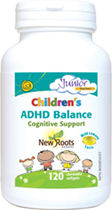Could My Child Have ADHD? Signs, Causes, and Natural Treatments
Attention-deficit/hyperactivity disorder (ADHD) is a common neurodevelopmental disorder that affects children, adolescents, and adults. It can cause issues with attention, impulsivity, hyperactivity, and executive functioning. Let’s review the signs and possible causes of ADHD in children in particular, as well as the effects of diets and supplements on reducing symptoms.
Signs to Look For
Some signs of ADHD in children are:[i]
- Difficulty staying focused on tasks or activities
- Being easily distracted by external stimuli
- Having trouble following instructions or completing assignments
- Being forgetful or losing things
- Fidgeting, squirming, or moving around excessively
- Talking too much or interrupting others
- Impulsivity
- Having difficulty organizing, planning, or prioritizing
If you notice these traits in your child and they interfere with their academic, social, or emotional functioning, it is advised to consult a pediatrician or a mental-health professional; they can help you determine if your child has ADHD and what treatment options are available.
Conventional treatment may include medication, behavioural therapy, parent training, or a combination of all these approaches.
Many parents are concerned about the side effects of medication and wonder if there are alternatives or complementary treatments. To add to this, studies have shown that ADHD may be overdiagnosed,[ii] and your child could be dealing with other factors that are creating ADHD-like symptoms, such as poor diet, heavy metal or toxin exposure, nutrient deficiencies, thyroid imbalance, other mental-health conditions, or learning disabilities. Lack of play and inability to express or engage in their true interests and nervous-system hypersensitivity are other factors that can create ADHD-like symptoms. With proper support and guidance, children with ADHD can thrive and succeed in life.
 Possible Causes
Possible Causes
The exact causes of ADHD are not fully understood, but researchers believe that a combination of genetic, environmental, and biological factors play a role. Some possible risk factors for ADHD are:[iii]
- Family history of ADHD or other mental-health disorders.
- Exposure to toxins, infections, or injuries during pregnancy or early childhood.
- Low birth weight or premature birth.
- Coexisting conditions such as learning disabilities, anxiety, depression, or autism spectrum disorder.
- Lack of exercise, play, or creativity and not enough healthy social interaction.
- Hormonal imbalances or nutrient deficiencies.
A Closer Look at Diet
Studies have suggested that certain dietary factors may play a role in the development or management of ADHD symptoms. Some of the dietary treatments that have been proposed for ADHD include:
- Elimination Diets: These diets involve removing foods or ingredients that may trigger or worsen ADHD symptoms, such as artificial colours, preservatives, sugar, gluten, dairy, or specific allergens. However, elimination diets can be difficult to follow and may cause nutritional deficiencies if not supervised by a health-care practitioner. This is a common practice done by medical and naturopathic doctors to see if any food sensitivities could be worsening symptoms.
- Feingold Diet: This is a type of elimination diet that excludes artificial colours, flavours, and preservatives, as well as some natural foods that contain salicylates, such as apples, grapes, tomatoes, and oranges.
An elimination diet, a Feingold diet, or a combination of both may be helpful.
Supplements to Consider
According to some studies, the following supplements may be beneficial for children with ADHD:[iv], [v]
- Omega‑3 Fatty Acids: These essential fats, found in fish and plant oils, are necessary for proper brain development, function, and mood regulation. By reducing inflammation, omega‑3 fatty acids can reduce ADHD symptoms and enhance cognitive performance and mood.
- Minerals (Zinc, Iron, Magnesium): Many children may be picky eaters, which can lead to the development of nutritional deficiencies. Zinc and iron are both involved in energy production, with iron being helpful for oxygen transport throughout the body. Low iron can also lead to restlessness, especially at night. Magnesium, an essential mineral, is involved in various physiological processes, including muscle function and the regulation of neurotransmitters in the brain. It has muscle-relaxing properties, which may help reduce tension in the body.
- B Vitamins: B6 and B12 act as cofactors for neurotransmitter production of serotonin, dopamine, and norepinephrine. These neurotransmitters play crucial roles in mood regulation and attention, which are areas of concern in ADHD.
- Probiotics: It is well known now that healthy brain function starts in the gut. Gut microbiome imbalances can create irritability, low mood, and anxiety as the unhealthy bacteria create less serotonin and GABA, an inhibitory neurotransmitter associated with the calming effects. Adding in the proper variety of probiotic bacteria can help reduce mood imbalances.
A naturopathic doctor (ND) can help determine which supplements may be most beneficial for your child.
Before trying any natural supplements or remedies for your child, you should consult with a health-care practitioner to determine the appropriate dosage, safety, and potential interactions with other medications. You should also monitor your child’s response to the supplements or natural remedies and report any adverse effects or changes in symptoms to your doctor. Adding in a naturopathic doctor to your health team can help determine the root causes of ADHD and ADHD-like symptoms and provide complementary dietary and supplement recommendations to ensure that the unique needs of your child are being well-managed and cared for.
 Dr. Kaitlyn Zorn, HBSc, ND
Dr. Kaitlyn Zorn, HBSc, ND
A Guelph naturopathic doctor who uses a blend of modern science and traditional healing therapies to treat the whole person. Her journey has helped her develop an interest in brain health, pain management, and critical illness relief.
drkaitlynzornnd.wixsite.com
References
[i] Centers for Disease Control and Prevention. Attention-Deficit / Hyperactivity Disorder (ADHD). Symptoms and Diagnosis of ADHD. https://www.cdc.gov/ncbddd/adhd/diagnosis.html · Updated 2023‑09‑27.
[ii] Kazda, L., K. Bell, R. Thomas, K. McGeechan, R. Sims, and A. Barratt. “Overdiagnosis of attention-deficit/hyperactivity disorder in children and adolescents: A systematic scoping review.” JAMA Network Open, Vol. 4, No. 4 (2021): e215335. https://jamanetwork.com/journals/jamanetworkopen/fullarticle/2778451
[iii] Millichap, J.G., and M.M. Yee. “The diet factor in attention-deficit/hyperactivity disorder.” Pediatrics, Vol. 129, No. 2 (2012): 330–337.
[iv] Bloch, M.H., and J. Mulqueen. “Nutritional supplements for the treatment of ADHD.” Child and Adolescent Psychiatric Clinics of North America, Vol. 23, No. 4 (2014): 883–897.
[v] Robberecht, H., A.A.J. Verlaet, A. Breynaert, T. De Bruyne, and N. Hermans. “Magnesium, iron, zinc, copper and selenium status in attention-deficit/hyperactivity disorder (ADHD).” Molecules, Vol. 25, No. 19 (2020): 4440.

 Stores
Stores
